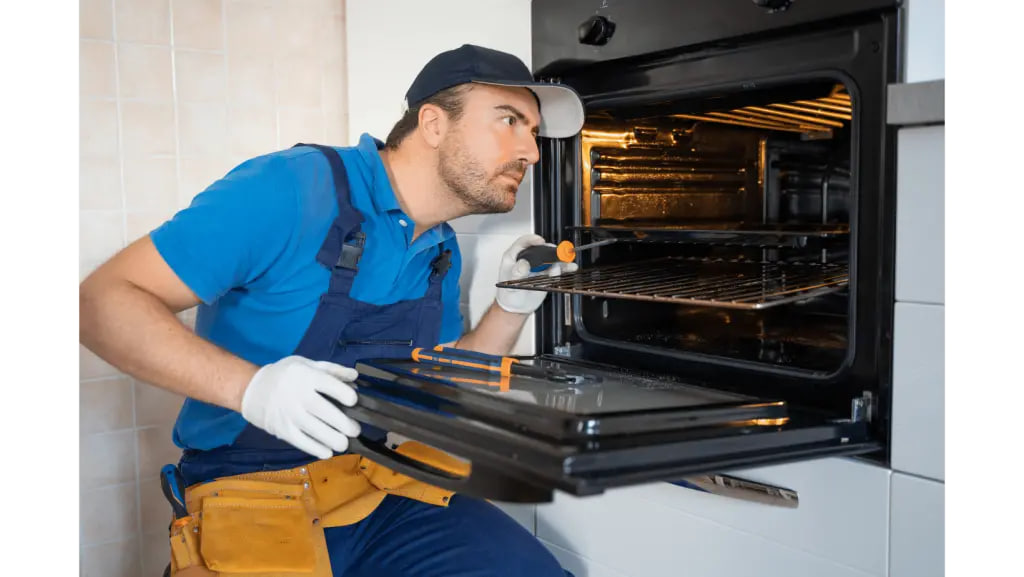Imagine this: you’re cooking dinner, everything smells wonderful, and suddenly your stove starts clanking. You hope that it goes away, but it persists, and even gets louder. That’s not exactly the soundtrack you had in mind for roast chicken night.
The truth is, unusual oven sounds can be unsettling, especially when they catch you off guard. A rattle here, a hiss there, and you’ll start wondering if your appliance is about to give up entirely.
Luckily, strange sounds don’t always mean big problems. Sometimes, the solution is surprisingly simple. Here’s how to figure out what’s happening and fix it before it turns into a real headache.
Identify the Type of Noise
Every oven has its quirks, but there’s a difference between the usual hum of cooking and a noise that makes you stop mid-stir. The trick is to pay attention to what kind of sound you’re actually hearing.
For example, a sharp clicking sound often indicates a loose metal component inside, which may signal a more serious issue. On the other hand, a low hissing might be nothing more than blocked airflow, the kind of thing a clogged vent can cause.
Then there’s the rattling or whirring that seems to come out of nowhere, but more often than not, it’s a fan or tray that’s shifted slightly out of place.
To make sense of it all, it helps to listen under different conditions. Tune in while the oven is heating up, when it’s running hot, and even as it cools down. You’ll notice the sounds change depending on what’s happening inside.
You can also record the noise on your phone. Many technicians swear by this method, since having a sound sample saves a lot of back-and-forth and gets straight to the problem.
Finally, don’t lean in too close while you’re playing detective. A cautious ear and a safe distance are more than enough to start piecing the puzzle together.
Check for Loose Parts
More often than not, the simplest answer is the right one, and a noisy oven can be as simple as something rattling around where it shouldn’t. Before you picture worst-case scenarios, take a moment to check the main components.
Start with the oven racks. They get knocked about easily, and if they’re not sitting properly, they’ll rattle every time the fan whirs or the oven door closes.
Slide them firmly into place and see if that quiets things down. While you’re at it, check the shelves and trays—they can shift just enough to make a surprising amount of noise.
Next, give the outside of the oven a quick inspection. Knobs, handles, and even the control panel can loosen slightly over time.
A gentle turn of the screwdriver is often all it takes to bring them back in line. It’s a quick fix you can handle yourself, no extra help required.
Once you’ve tightened everything, give the oven a little nudge. You don’t have to forcefully move it, just shake it a little to test whether anything is still rattling around.
If the oven stays quiet, the kitchen will, too. Fire it up for a test run, and more often than not, you’ll find the problem solved without much fuss at all.
Examine the Door
The source of the racket isn’t always inside the oven—it could also be the door. Hinges and seals can wear down, letting heat and noise escape.
The first check is easy. Close the door fully and look for any gaps between the frame and the seal. If you spot one, the hinges could be the culprit. Their screws loosen over time, and a quick tightening usually brings the door back into alignment.
If the hinges are fine, run your hand gently along the rubber gasket. Over the years, it can wear out, crack, or flatten in places. That thin strip of rubber has an important job, which is keeping the heat in and the noise out. Once it starts to fail, you’ll notice the difference straight away.
The upside is that replacing a gasket is quite easy. Pop the old one out, press the new one into place, and you’re back in business.
Inspect the Heating Elements
Sometimes, the culprit behind a noisy oven is hiding in plain sight: the heating elements themselves.
Always switch the oven off and unplug it before you take a closer look at them. For electric models, check them for cracks, discolouration, or spots of rust. Those are all red flags that the part is wearing out and needs replacing.
Checking or replacing heating elements is easier than it seems. Most user manuals guide you step by step, and if you’re comfortable with a screwdriver, it’s something you can handle yourself.
Gas ovens can be a bit tricky as well. If yours is making a strange sound, take a peek at the burner. Blockages, grease, or even a bit of rust can cause uneven burning and that unsettling hiss.
A soft, dry cloth is usually enough to wipe away the debris. Before you reassemble it, just make sure the burner is completely dry to prevent water damage.
Look for Fan Issues
One of the most common sources of strange oven noises is the internal air circulation. When it’s running smoothly, you barely notice it.
However, when something is off, you’ll hear it straight away as a strange hum, a scraping sound, or an uneven whirr that makes you pause mid-recipe.
The first step is safety. Switch the oven off and pull the plug before you do anything else. Then take a look at the fan. It’s usually tucked away at the back or top of the oven.
It’s common for bits of food or grease to lodge themselves there, and a careful wipe with a soft cloth is often enough to set things right.
If the noise continues, see if the fan is loose. Over time, screws can loosen, and a simple tightening often fixes the problem. Some fans may also run more quietly with a small dab of lubricant. Just don’t overdo it.
When to Call an Expert
Most oven noises can be sorted with a bit of cleaning, tightening, or patience, but there comes a point where DIY has to step aside. If the clatter is getting louder, refuses to stop, or comes with other warning signs, it’s best to call in a professional.
Electrical symptoms are especially serious. Flickering lights on the control panel, tripping breakers, or the sight of sparks are all red flags that need urgent attention.
The same goes for gas ovens. If you smell gas or hear a persistent hiss, step away and get help immediately. Gas leaks can be downright dangerous.
In these situations, a qualified technician can provide precise oven cleaning and any necessary repairs, especially if dirt or grime is contributing to the noise. The result is a quieter oven that runs safely, efficiently, and reliably.
Conclusion
Strange noises in the kitchen can make you feel like you’ve stepped into a suspense film, where a sudden clank is the cue for everyone to run for the exits. In reality, it’s usually not so dangerous. It’s just your oven’s way of saying it could use a little care.
At the end of the day, the real goal isn’t silence for its own sake. It’s a reliable oven that lets you focus on what really matters: good food and good company.

